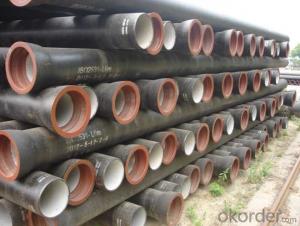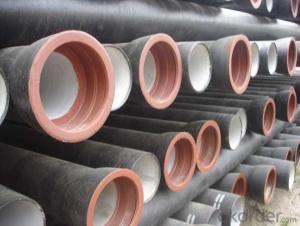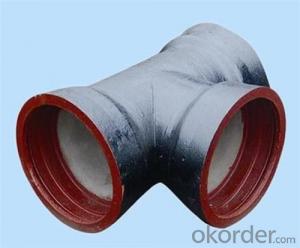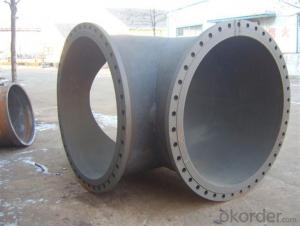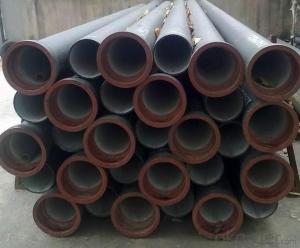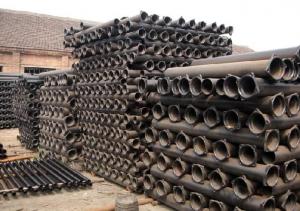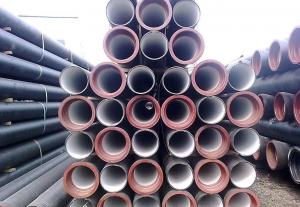Ductile Iron Pipe EN545 DN700 High Quality
- Loading Port:
- China main port
- Payment Terms:
- TT OR LC
- Min Order Qty:
- 999 m
- Supply Capability:
- 9999 m/month
OKorder Service Pledge
OKorder Financial Service
You Might Also Like
1,Ductile Iron Pipe Description :
1) Pipes confirm to ISO2531,K9 class,T type joint,6m long,with inside cements lining conform to ISO4179, outside Zinc spraying(130g/m2) and bitumen coating(70μm) conform to ISO8179.
2) Pipe ends: Spigot and socket ends, with 100% SBR rubber gaskets
accoding to ISO4633
3) we can do third party inspection according to customer's request.
4) Our products have been sold to many international market, such as Middle East and South East Asia and Africa.
2,Main Features of the Ductile Iron Pipe:
•High yield strength
•High corrosion resistance
•Installation is convenient
•Satisfy the highest hygienic standards
1. Material: Ductile iron grade 500-7/ 450-10 in accordance with ISO1083
2. Standard: ISO 2531, EN545, EN598, ANSI, AWWA
3. Certificate: ISO9001, ISO14001, SGS, NSF, WRAS
4. Test: In accordance with ISO 2531 / EN 545 / EN598 and 100% water pressure test
5. Length: 6m or cut into 5.6m, 5.7m, 5.8m
6. Internal Lining: Cement, conform to ISO4179
7. External coating: Zinc + Bitumen, conform to ISO8179
3,Ductile Iron Pipe Images:
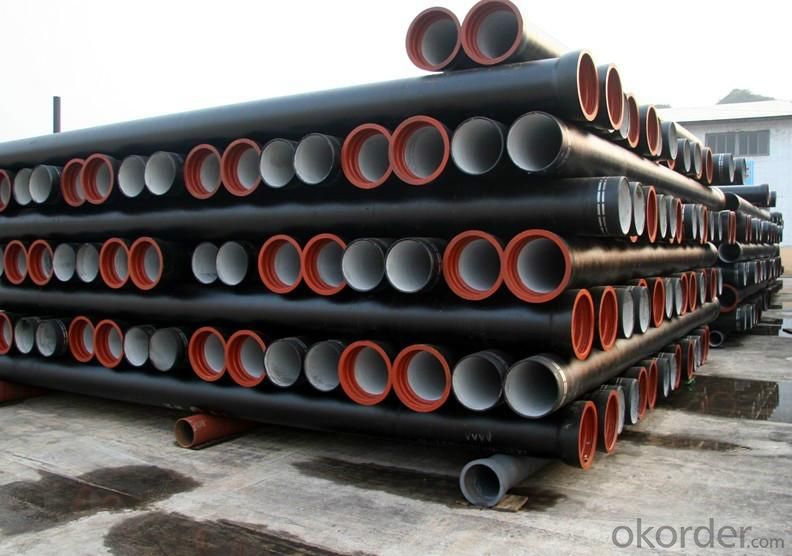
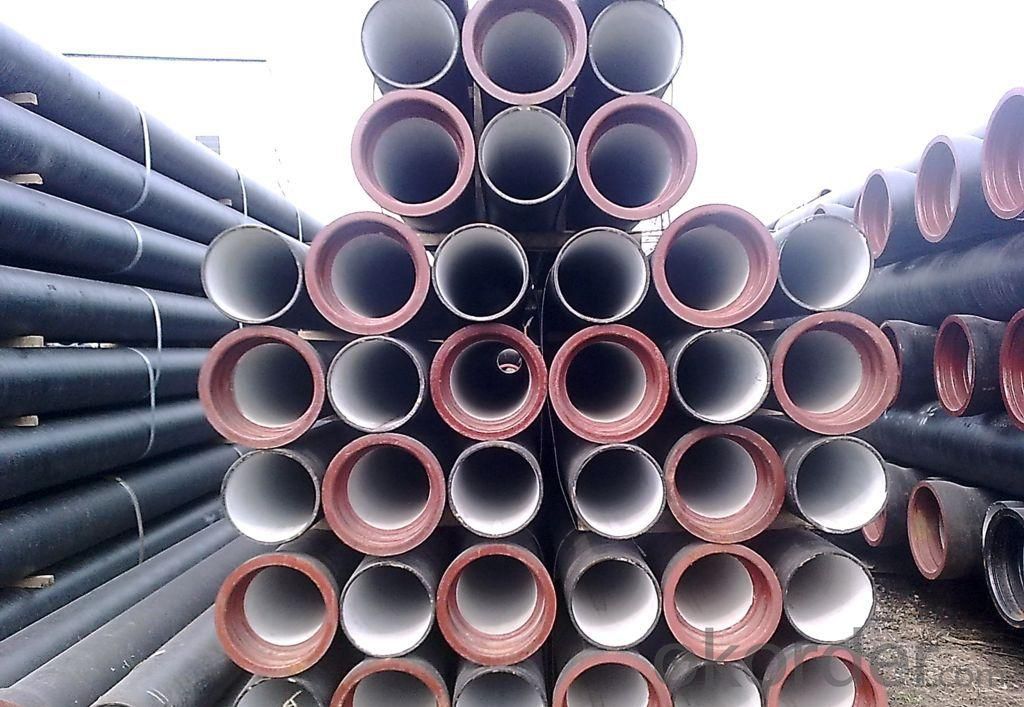
4. Ductile Iron Pipe Specification
Subsidiary of Forbes Fortune 500 company (Ranking 485th in 2011).
Provides full rang of ductile iron pipes with finest quality.
Surface Finishes Bare, Oiled, Mill Varnish, Galv,FBE, FBE Dual,
3LPE, 3LPP, Coal Tar,Concrete Coating and Tape Wrap
End Finishes Beveled, Square Cut, Threaded, hat
Additional Services Internal Coating
Packaging packed in bag, plastic bag, steel strip, steel wire,double wire, iron box, wooden box, tarpaulin,
plastic sheeting
Inspection MOODY SGS BV GL DNV ABS LIOYD’S
Test X-ray, UT, magnetic particle,inspection,hydrostatic test.
Processing service Beveling, Threading, Slotting, Cut-to length, Bends, Quench and Temper, Fabrication, Double-jointing and On-site assistance
Documentary MTC, material certification,Origin certification, CI or PI,Test Report, export licence, handling order, B/L,insurance policy,shipping instructions, contract, packing list etc.
5.FAQ:
We have organized several common questions for our clients,may help you sincerely:
1.Q: Why would you choose ductile iron pipe rather than other pipe materials?
A:The reasons are obvious for that not only ductile iron pipe possesses the inherent strength and flexibility of ductile iron, combined with proven corrosion protection systems, but also the cost savings can be achieved from design to installation and commissioning.
2.Q:Why can you guarantee the inner of pipes can’t be corroded?
A: High alumina cement mortar lining and sulphate-resistant cement mortar lining. These two special linings are applicable to inner anti-corrosion for sewage pipes, improving resistance to erosion of the sewage components.
- Q: Are ductile iron pipes suitable for landfill leachate collection?
- Yes, ductile iron pipes are suitable for landfill leachate collection. Ductile iron pipes have excellent corrosion resistance, which is crucial for handling landfill leachate that can contain various corrosive substances. These pipes also have high strength and durability, allowing them to withstand the pressure and stress of the leachate collection system. Furthermore, ductile iron pipes are known for their ease of installation and maintenance, making them a practical choice for landfill leachate collection systems. Overall, ductile iron pipes offer the necessary properties and characteristics to effectively and efficiently collect landfill leachate.
- Q: What are the typical applications for ductile iron pipes?
- Ductile iron pipes are commonly used in various applications due to their unique properties and advantages. Some of the typical applications for ductile iron pipes include: 1. Water Supply Systems: Ductile iron pipes are extensively used in water supply systems, including municipal water distribution networks, as they provide excellent resistance against corrosion and have high durability. They can withstand high pressure and offer long service life, making them ideal for transporting potable water. 2. Wastewater and Sewage Systems: Ductile iron pipes are also widely utilized in wastewater and sewage systems. They can handle the transportation of sewage and other wastewater effectively due to their strength and resistance to chemical corrosion. These pipes are commonly used in underground sewer lines, sewer force mains, and wastewater treatment plants. 3. Industrial Applications: Ductile iron pipes find applications in various industrial sectors. They are commonly used for transporting different types of fluids, such as chemicals, slurries, and abrasive substances. Their strength, toughness, and resistance to external loads make them suitable for industrial pipelines, including those in power plants, refineries, and mining operations. 4. Irrigation Systems: Ductile iron pipes are frequently employed in irrigation systems for agriculture, landscaping, and golf courses. These pipes can withstand high water pressure and provide a reliable solution for transporting water over long distances. Their corrosion resistance ensures water quality is maintained, and their durability reduces the need for frequent maintenance. 5. Fire Protection Systems: Ductile iron pipes are widely used in fire protection systems, including sprinkler systems and fire hydrants. Their strength and ability to withstand high pressure make them suitable for delivering water rapidly in case of fire emergencies. These pipes are also resistant to heat, making them a reliable choice for fire protection applications. In summary, ductile iron pipes are versatile and widely used in various applications, including water supply systems, wastewater and sewage systems, industrial pipelines, irrigation systems, and fire protection systems. Their durability, corrosion resistance, and ability to withstand high pressure make them a preferred choice for these applications.
- Q: How much water seepage is allowed in the water pressure test for water hose DN300?
- The main control parameters of ductile iron pipes are nominal diameter, working pressure, connection mode, etc.. Light, high, thin wall, pressure resistance, shock resistance, corrosion resistance, earthquake resistance and other properties. The flexible interface is used for the pipeline interface, and there is a certain elongation and deflection angle. He has the advantages of raw iron pipes and steel pipes, avoiding the defects of iron and steel.
- Q: Are ductile iron pipes suitable for use in power plants?
- Yes, ductile iron pipes are suitable for use in power plants. They possess excellent mechanical properties, such as high strength, durability, and impact resistance, making them suitable for transporting water, steam, and various chemicals in power plant applications. Additionally, their corrosion resistance and ability to withstand high temperatures make them a reliable choice for conveying fluids in power generation facilities.
- Q: Is the spigot and socket connection of the ductile iron tube reversed?
- The three pass joint is formed by flattening a tube blank larger than three through diameter to approximately three through the diameter and opening a hole at the point of the branch pipe;
- Q: What is the excavation width of ductile iron pipes with diameters greater than 1400?
- Then, according to the soil characteristics, different slopes are calculated, and the width of the excavation is calculated according to the depth and slopeIf the soil is soft, high water content and easy to collapse, the excavation width will be wide, otherwise the slope will be steep and the excavation width will be narrow
- Q: Are ductile iron pipes suitable for underground applications?
- Indeed, underground applications are well-suited for ductile iron pipes. Renowned for their durability, strength, and resistance to corrosion, these pipes emerge as an excellent option for installations that lie beneath the surface. Their ability to withstand immense loads, ground shifts, and external pressure further solidifies their appropriateness for burial underground. Moreover, given the challenges associated with access and maintenance in underground scenarios, the fact that ductile iron pipes boast a lifespan of over 100 years becomes invaluable. In conclusion, the reliability and suitability of ductile iron pipes for underground applications are underscored by their robustness and longevity.
- Q: How do we handle the leaking of the ductile iron pipe?
- A hoop is a component that holds or ties another material with one material. It belongs to the fastener. The hoop holding device is composed of a hoop plate, a wing plate, a tension tie plate, a bolt and an inner liner. There are many kinds of hoop, hoop cable, wire rod hoop, hoop cable, wire hoop, stainless steel hoop are commonly used.
- Q: What is ductile iron?
- Ductile iron, after being treated with either magnesium or cerium, undergoes an improvement in its mechanical properties. This particular type of cast iron earns the name "ductile" due to its higher degree of ductility in comparison to other cast iron varieties. Ductility pertains to a material's capacity to stretch or deform without breaking. This quality renders ductile iron particularly ideal for applications that demand both high strength and resistance to wear and tear, such as pipes, automotive components, and machinery parts. The inclusion of magnesium or cerium during the manufacturing process aids in the formation of graphite within the iron's structure, contributing to its distinctive properties. This graphite formation serves to enhance the iron's flexibility and reduce its brittleness, enabling it to absorb shock and vibrations without fracturing. As a whole, ductile iron presents a fine balance between the strength of cast iron and the flexibility of steel, thereby establishing itself as a versatile material well-suited for diverse industrial applications.
- Q: What are the interface forms of ductile iron pipes? The best drawings are available. Thank you
- T interface type sealing ring is a self sealing rubber ring, when the pipe internal pressure increases, the contact pressure between the seal and the pipe increases, T interface can not only allow the deflection angle of the axial displacement, and convenient for installation. When the T type interface is installed, the sealing of the rubber ring can be ensured as long as the socket is simply loaded into the socket and the rubber ring is pressed tightly. This kind of interface has the advantages of reliable sealing, good seismic resistance and corrosion resistance, and it is a better interface.
Send your message to us
Ductile Iron Pipe EN545 DN700 High Quality
- Loading Port:
- China main port
- Payment Terms:
- TT OR LC
- Min Order Qty:
- 999 m
- Supply Capability:
- 9999 m/month
OKorder Service Pledge
OKorder Financial Service
Similar products
Hot products
Hot Searches
Related keywords
